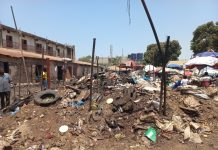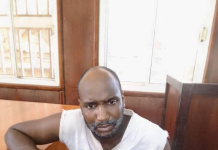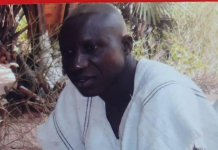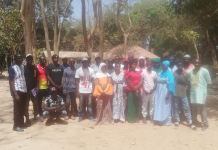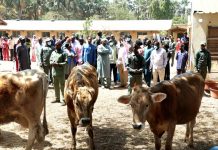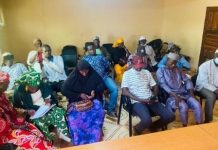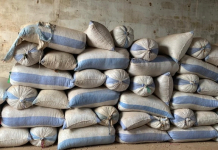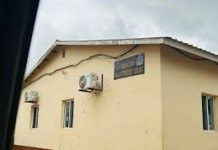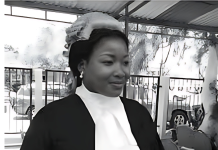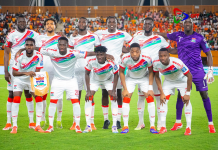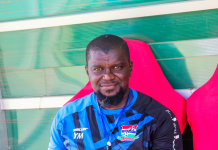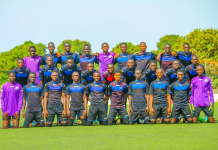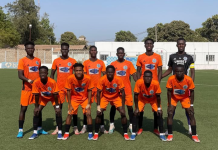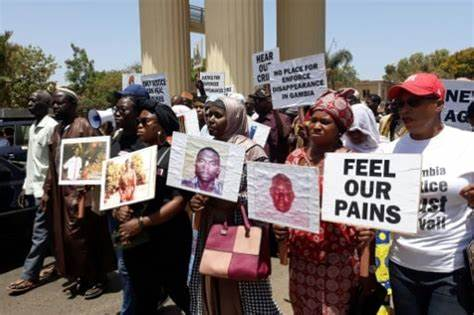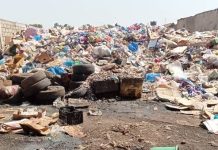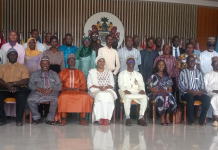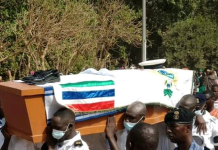By Yankuba Jallow with New Narratives
- Government to launch delayed Reparations Commission this month
- Victims express frustration over delays
- Funding for reparations remains a major challenge, worsened by U.S. aid cut
Victims of human rights violations in The Gambia are growing increasingly frustrated over delays in processing reparations. While the speed of The Gambia government’s transitional justice process has attracted praise among international human rights observers, for victims – many of whom continue to suffer physical and mental injuries from the alleged crimes of the regime of Yahya Jammeh – the process has taken too long.
The government has taken important steps toward justice, including the establishment of a Special Criminal Division to prosecute crimes as recommended in the country’s 2021 Truth, Reconciliation, and Reparations Commission report. But for more than 1,000 victims it is the payment of reparations – in the forms of financial compensation and support for their well-being – that is most urgent.
According to its own implementation plan, the government is behind schedule. A Reparations Commission should have been fully staffed and equipped by June in 2024. Given the nine-month delay in establishing the Reparations Commission, victims fear the payments will now be delayed.
“We need to fast-track the process,” Sirra Ndow, chairperson of the Alliance of Victim Led-Organisations said. “Victims are dying, and this is a cause for concern.”
Ida Persson, Special Advisor to the Minister of Justice on Transitional Justice, acknowledged the delays and said the Reparations Commission is now expected to begin operations this week. She said that ensuring victims receive reparations remains the top priority.
The Victims Reparations Commission, established under the Victims Reparations Act 2023, is an independent body responsible for managing and overseeing reparations for victims of human rights violations during Yahya Jammeh’s regime. The Reparations Fund, supported by government allocations and proceeds from Jammeh’s confiscated assets, provides financial and other forms of compensation to victims as part of The Gambia’s transitional justice efforts.
Nogoi Njie was one of the victims for whom reparations have come too late. She was arrested by government forces in April 2016 for participating in a demonstration demanding electoral reforms. Njie told the Truth Commission that she was battered by agents of the National Intelligence Agency and sustained severe injuries. She died in September 2023.
“How many more victims must die before the government takes this process seriously?” said Sheriff Kijera, a victims advocate.
Advocates warned that victims are “dying one by one” while waiting for reparations, with others struggling in extremely difficult conditions due to their deteriorating health. For those who endured torture, sexual violence, and other forms of abuse under the Jammeh regime, the lack of medical support has made daily survival a challenge, they say.
The government, along with many national and transitional justice groups, has been struggling to reassess its position after the surprise cut of almost all foreign aid by the administration of United States President Donald Trump. The Gambia was one of many countries counting on the US for a large contribution to its transitional justice process estimated at $300 million. The Government allocated D20 million for the operations of the Commission and another D20 million for support to victims.
Persson said the government is also engaging other partners, including the European Union, African Union, and United Nations, to secure alternative sources of support.
“We are hopeful that the American government will lift the ban,” she said, without giving any reason for that claim. “But in the meantime, we are working to ensure there are no delays in reparations.”
If it gets underway as planned, The Gambia’s process will happen much faster than others in the region. Victims of Sierra Leone’s brutal 10-year civil conflict received just $80 each, more than a decade after the end of their conflict. Liberia’s victims – from it’s 23 years of civil crisis – are still waiting.
Reed Brody, an American human rights lawyer who has played an active role in helping The Gambia establish transitional justice mechanisms, says The Gambia can still meet that two-year target if it aggressively pursues diplomatic and financial backing.
“Transformative reparations” to ensure injustices are not repeated
The implementation plan recommends so-called “transformative reparations” which go beyond traditional simple payments, to addresses the underlying causes of human rights violations and promote long-term social change. Instead of simply restoring victims to their previous state, transformative reparations aim to improve their lives and ensure that injustices do not happen again.
When the Reparations Commission gets going, its first task will be to review reparations started by the Truth Commission, register new victims who were not covered and come up with a comprehensive reparations for all victims.
The Reparations Commission is responsible for identifying and compensating victims of human rights violations, managing financial reparations, providing medical and psychological support, overseeing education and livelihood assistance among victims. It will also monitor the government’s commitment to reparations and seek international funding to support justice initiatives.
Ndow said that her organization has been advocating for a more structured and transparent reparations process. She noted that while victims have been involved in transitional justice efforts, many still lack adequate support. She said the victim community is ready to work with the Commission to ensure that the victims get the compensation needed.
The recent U.S. aid cut has not just impacted the ability to pay victims. It’s also impacted the ability to reach them. Zainab Baldeh-Lowe, an advocate, said US cuts have also impacted public awareness campaigns that help victims access reparations.
“A huge chunk of the work in advocating for justice and accountability cannot be met as expected,” she said. “Victims may lack the necessary information to boost their support in ensuring that the laws are enforced.”
In response to the cuts, Ndow’s group is working to raise more funds itself. They are considering generating revenue through visitor payments at the Memory House among other alternative funding sources.
Still, some victims groups are still fighting for more support. The Gambia government has estimated it will cost $60 million to try 69 perpetrators of crimes. Kijera says the $4 million allocated for more than 1,000 victims is too small.
“That is a pittance—it is a slap in the face of the victims,” Kijera said. “Victims should be generously compensated compared to what the Minister of Justice is asking for to prosecute a handful of perpetrators.”
Persson said the government is waiting for the commission to do its job and after that they will come to know the cost for the reparation. She insisted that no one knows how much is needed for reparations.
Kijera criticized the government’s heavy reliance on foreign aid, arguing that The Gambia should take greater responsibility for funding the reparations program. He proposed the establishment of a presidential fund dedicated to mobilizing resources for victims based on a recent successful fund for the nation’s football body.
“The government should set up a presidential fund for resource mobilization, just as they did for the Gambia Football Federation,” he said. “More needs to be done to ensure victims receive what they deserve.”
This story was a collaboration with New Narratives as part of the West Africa Justice Reporting Project.
